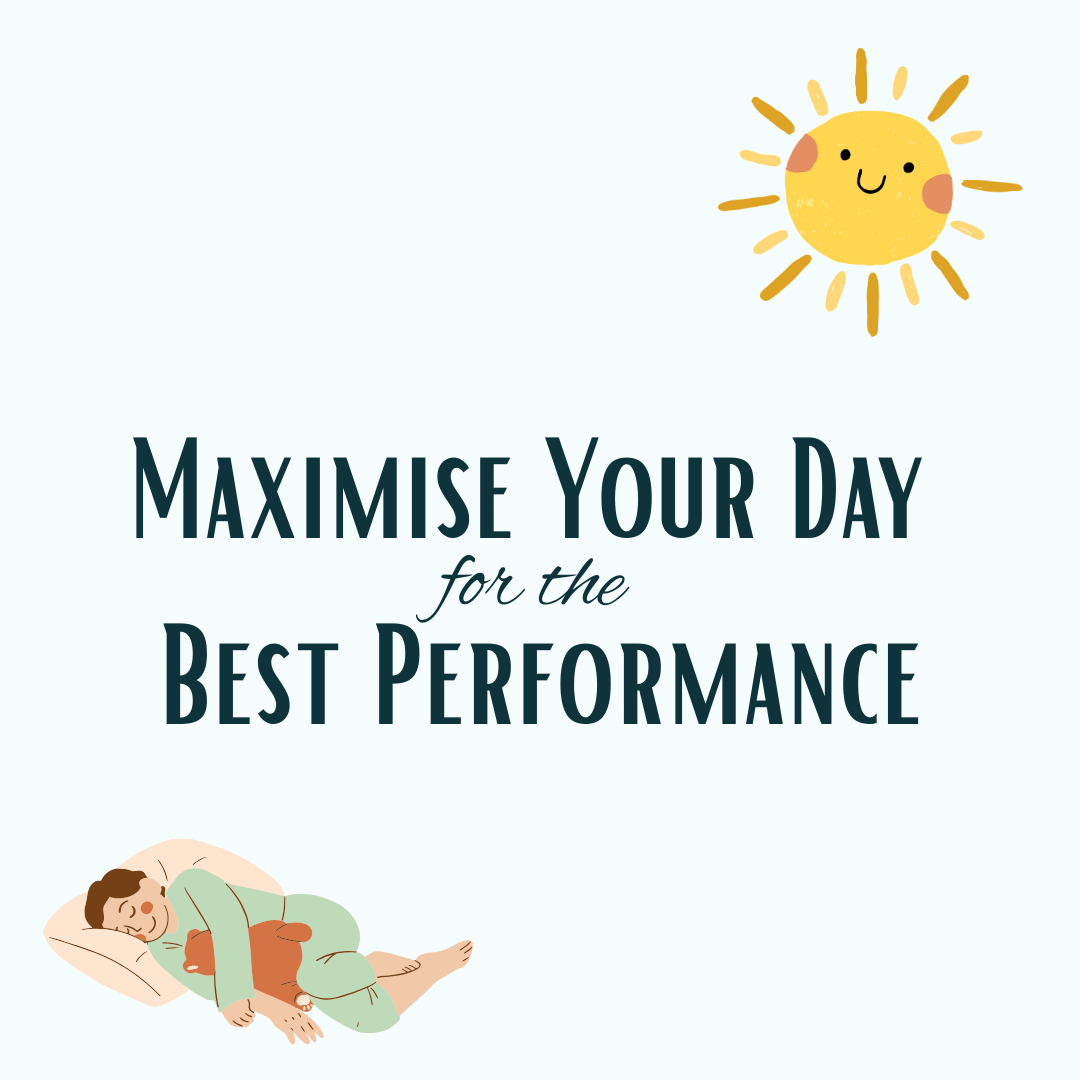We all want to get the most out of our day, whether that’s being productive at work, performing better in exercise, or simply having more energy to enjoy life. The secret often lies in how we align our daily habits with our body’s natural rhythm. Small, consistent steps throughout the day can have a huge impact on your focus, energy, and wellbeing.
Morning
Start your morning with hydration – aim for around one litre of water soon after waking. Try to avoid caffeine for the first 90–120 minutes (unless you’re drinking it before exercise) to prevent the dreaded afternoon slump. If you’d like, add a small pinch of sea salt to your water to boost electrolyte balance.
Getting natural light exposure first thing is one of the most powerful ways to set up your day. Spend 10–30 minutes outside looking towards the sunrise (but never directly into it), ideally without sunglasses. This light triggers a natural rise in cortisol – a hormone released by the adrenal glands – which helps shift your body from sleep to wakefulness. The result? More energy, a better mood, and improved alertness in the morning, as well as better sleep at night. If you can combine light exposure with a walk, even better. Walking creates a visual effect called “optic flow” – the sense of your surroundings moving past you. This naturally calms the amygdala, the part of your brain linked to stress and fear, leaving you feeling more relaxed and less anxious.
When it comes to work, the first 1–4 hours after waking are often the most productive for mentally demanding tasks. Exercise can also be a great addition in the morning, as it increases blood flow to the brain, enhancing focus and productivity.
Afternoon
To avoid the post-lunch crash, choose a lighter, lower-carb meal. A short walk of 5–30 minutes after eating not only helps digestion and metabolism but also reinforces your circadian rhythm – your body’s internal clock. Your circadian rhythm regulates sleep, wakefulness, hormone release, digestion, and even body temperature. Light exposure and consistent routines are the strongest signals that keep this clock aligned. When this is in sync, you’ll experience better sleep, more stable energy, and improved mood. When it’s disrupted, it can lead to fatigue, brain fog, and difficulty concentrating.
If energy levels do dip, consider either a short nap (20 minutes or less to avoid grogginess) or a non-sleep deep rest (NSDR) session for 10–30 minutes. NSDR is a form of guided relaxation that boosts dopamine and restores mental energy. If you feel energised, there’s no need to rest at all.
Exercise in the afternoon can be especially beneficial. It helps regulate blood sugar, balance hormones, strengthen immunity, and depending on the type, either give you an energy boost or help you wind down.
In the evening, choose a dinner higher in both carbs and protein to encourage relaxation and support good sleep. Exposing yourself to natural light around sunset can help protect your sleep from the negative effects of artificial light later in the evening.
NSDR Routine:
-
Find a quiet space
Lie down or sit comfortably in a place where you won’t be disturbed. Close your eyes.
-
Slow your breathing
Inhale gently through your nose for 4–5 seconds, then exhale slowly for 6–7 seconds. Continue until you feel your body begin to relax.
-
Scan your body
Starting from the top of your head, bring your attention to each body part – face, shoulders, arms, chest, back, legs, feet.
As you focus on each area, consciously release any tension.
-
Shift into relaxed awareness
If thoughts arise, notice them and let them drift away like clouds, gently returning your focus to your breath and body.
-
Optional visualisation
Imagine a calm place (such as a beach or forest). Picture yourself there, breathing deeply, safe and at ease.
-
Ease back gently
After 10–20 minutes, bring your awareness back to your surroundings. Wiggle your fingers and toes, then slowly open your eyes.
Night
Consistency is key. Aim to wake up at roughly the same time every day (+/- 1 hour), as this keeps your circadian rhythm stable. In the evening, create a sleep-friendly environment. Lower lights soon after sunset, avoid bright overhead lighting, and dim screens. Using a red or warm-toned filter on devices is even better. At bedtime, keep your room as dark as possible with blackout blinds or an eye mask, and slightly cooler than usual (1–3°C lower). If you wake during the night, practising NSDR can help you return to sleep more quickly.
Summary
The best way to maximise your day is to work with your body’s natural rhythm, not against it. Start your mornings with hydration and natural light, tackle your most demanding work early, and use food, movement, and rest strategically to keep your energy steady throughout the day. Evenings are about winding down, while a consistent bedtime routine and sleep-friendly environment help reset you for the day ahead.
Most importantly, remember that consistency matters more than perfection. You don’t need to follow every step perfectly every day – but building these habits into your lifestyle will pay off over time, giving you more energy, focus, and balance.


